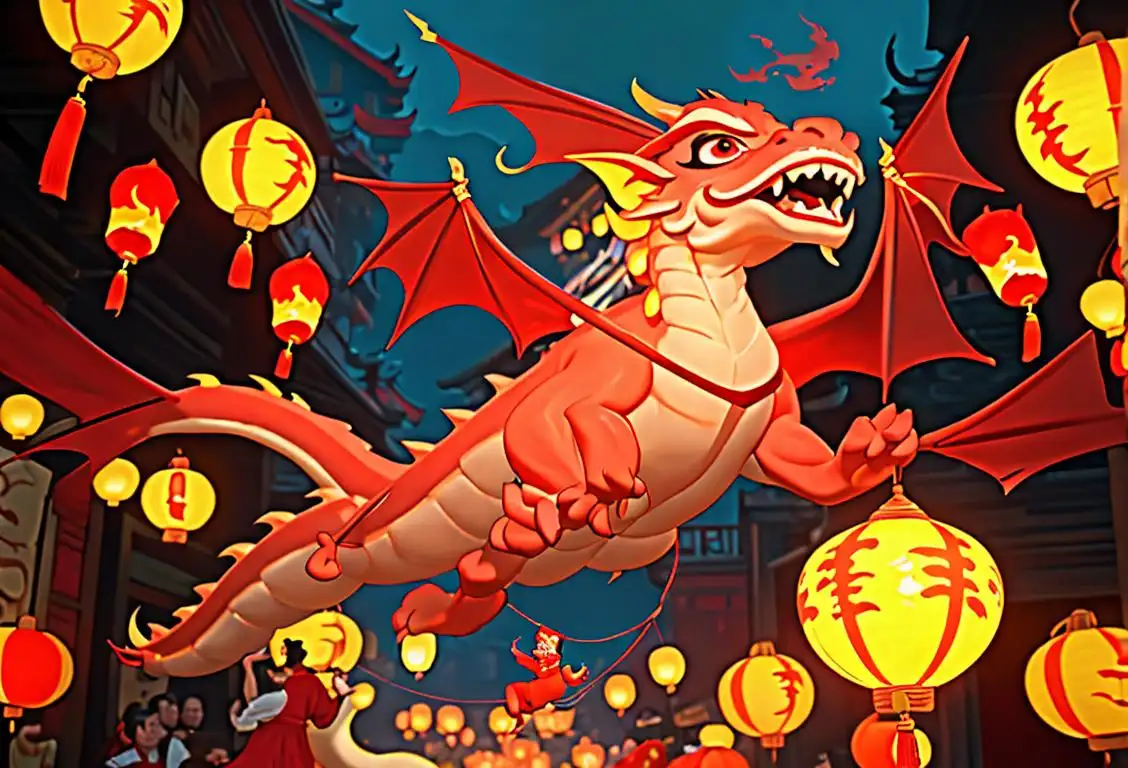National Korean Day

Welcome to the wonderful world of National Korean Day! Get ready to dive into a celebration like no other, filled with delicious food, vibrant traditions, and fascinating history. Whether you're a fan of K-pop, Korean cuisine, or simply curious about this beautiful culture, National Korean Day has something for everyone. So grab your bibimbap and let's explore the captivating world of Korea!
When is Korean Day?
It's national korean day on the 25th September.
Origins of National Korean Day
First things first, let's uncover the origins of National Korean Day. This delightful day gained popularity in recent years as a way to appreciate the rich heritage and contributions of Korea. It's the perfect occasion to honor the Korean people, their customs, and their achievements.
The Internet Influence
With 116 mentions detected online, National Korean Day has gained quite the following. From heartfelt blog posts to lively social media discussions, people from all walks of life have come together to express their love for Korean culture. The peak of online mentions was recorded on September 25, 2018, when Korea's influence took the internet by storm!
A Taste of Korea
One cannot talk about Korea without mentioning its mouthwatering cuisine. From delectable dishes like bibimbap and kimchi to addictive street food like tteok-bokki and bungeoppang, Korean food never fails to delight the taste buds. National Korean Day is the perfect excuse to indulge in these irresistible treats and satisfy your inner foodie.
Korean Traditions and Entertainment
Aside from food, Korea is also known for its rich traditions and mesmerizing entertainment. Whether you're captivated by the elegant art of hanbok, intrigued by the beauty of traditional tea ceremonies, or mesmerized by the catchy beats of K-pop, National Korean Day offers a glimpse into the diverse tapestry of Korean culture.
Let's Celebrate!
So how can you celebrate National Korean Day? Well, the possibilities are endless! You can organize a K-drama marathon with your loved ones, try your hand at a new Korean recipe, or even learn a few basic Korean phrases to impress your friends. Regardless of how you choose to celebrate, remember to embrace the spirit of appreciation and respect for Korean culture.
History behind the term 'Korean'
918
Formation of Goryeo
In 918, the kingdom of Goryeo was established by King Taejo. The name Goryeo eventually evolved into the modern term 'Korea'. Goryeo was named after the ancient Goguryeo kingdom that existed in the same region during the Three Kingdoms period.
918 AD
The Founding of the Goryeo Dynasty
In 918 AD, the Goryeo Dynasty was founded by King Taejo. The term 'Korean' finds its origin from this era, as the name Goryeo eventually evolved to become Korea. The Goryeo Dynasty lasted for nearly 500 years and played a vital role in shaping Korean history and culture.
4th century BCE
The name 'Korea' originates
The name 'Korea' is believed to have originated from the Goguryeo kingdom, which was one of the ancient Three Kingdoms of Korea. The Goguryeo kingdom called their country 'Goryeo,' which gradually evolved into 'Korea' in Western languages.
2nd Century BCE
Birth of the Samhan
During the 2nd century BCE, the Korean Peninsula was inhabited by various tribes and kingdoms. One of these kingdoms, called Samhan, emerged as a dominant power. The term 'Korean' finds its origins in the name Samhan, as it refers to the people living in this region.
2333 BC
The Birth of Korea
The history of the term 'Korean' can be traced back to the ancient Korean kingdom of Gojoseon, which was established in 2333 BC. It is believed to be the earliest recorded state-level society on the Korean Peninsula. The people of Gojoseon referred to themselves as 'Joseon,' which is the root of the term 'Korean'.
37 BCE
The Early Kingdoms
The term 'Korean' can be traced back to the first century BCE when four distinct kingdoms, referred to as the Three Kingdoms and Gaya, existed on the Korean Peninsula. These kingdoms shared cultural similarities, but each had its own unique language and customs.
918
The Founding of Goryeo
The term 'Korean' is derived from the name of a kingdom called Goryeo, which was founded in 918 by King Taejo. The name 'Goryeo' itself originated from the ancient kingdom of Goguryeo, which emerged in the 3rd century BCE and flourished for several centuries in what is now North and South Korea. The people of Goryeo referred to themselves as 'Goryeoin,' and eventually, this term evolved into 'Korean'.
4th Century CE
Three Kingdoms Period
In the 4th century CE, the Korean Peninsula underwent significant political changes as three major kingdoms emerged: Goguryeo, Baekje, and Silla. These kingdoms played a crucial role in shaping Korean history and culture. The term 'Korean' gained further prominence as it became associated with the people residing in these kingdoms.
668 CE
The Unification of Korea
In the year 668, Silla, one of the Three Kingdoms, successfully unified the Korean Peninsula under its rule. This led to a significant integration of the different cultures and languages of the region, contributing to the development of a distinct Korean identity.
1392 AD
The Establishment of the Joseon Dynasty
In 1392 AD, the Joseon Dynasty was established, marking a significant turn in the history of Korea. During this era, the name 'Korean' gained further prominence as the term used to describe the people and culture of the Joseon Dynasty. The Joseon Dynasty lasted for almost 500 years and became renowned for its Confucianism-inspired governance and cultural achievements.
1392
Founding of Joseon
In 1392, the Joseon Dynasty was founded by General Yi Seong-gye. This period contributed significantly to Korean culture and identity. The term 'Korean' continued to be associated with the people of Joseon, further influencing the usage of the term.
57 BC
The Han Empire Influence
In 57 BC, the Han Dynasty of China conquered the northern region of the Korean Peninsula and established the commandery of Lelang. This marked a significant turning point in Korean history as the Chinese influence began to shape the region's culture and society. The Chinese referred to the people in this region as 'Gaojuli,' which later evolved into 'Goryeo' in Korean.
1392
The Joseon Dynasty
In 1392, the Joseon Dynasty was established, replacing Goryeo as the ruling kingdom. During the Joseon Dynasty, the term 'Korean' gained more prominence as the ruling class adopted it in official documents and discourse. The Joseon Dynasty lasted for over five centuries, shaping Korean culture, politics, and society, and further solidifying the term 'Korean' as an integral part of Korean identity.
668 CE
Unified Silla Kingdom
In 668 CE, the Silla kingdom unified the Three Kingdoms of Korea to form a single kingdom known as the Unified Silla Kingdom. During this time, the name 'Korea' gained more prominence.
918 AD
The Goryeo Dynasty
In 918 AD, the kingdom of Goryeo was established, and it lasted for nearly 500 years. The name 'Goryeo' became the official name of the kingdom, and its people were referred to as 'Goryeoin.' During this period, the term 'Goryeo' gradually transformed into 'Koryo' in English, which became the basis for the modern term 'Korea'.
1910
Japanese Colonial Period
From 1910 to 1945, Korea was under Japanese colonization. During this period, the Japanese government tried to assimilate Koreans by forcing them to adopt Japanese names. However, the term 'Korean' maintained its significance within the Korean community, symbolizing their shared history and culture.
1392 CE
The Joseon Dynasty
The Joseon Dynasty was established in 1392 and lasted for nearly five centuries, becoming one of the longest-ruling dynasties in Korean history. During this time, the term 'Joseon' was commonly used to refer to the Korean people. This dynasty witnessed the creation of Hangul, the Korean alphabet, which played a crucial role in shaping the Korean language.
1910
Japanese Occupation
In 1910, Korea was annexed by Japan, leading to a period of harsh occupation that lasted until the end of World War II in 1945. During this period, the Korean people faced significant cultural suppression and forced assimilation. However, the term 'Korean' continued to be used by Koreans themselves and in international contexts, serving as a symbol of resilience and resistance against the occupation.
1392 CE
Joseon Dynasty and 'Joseon'
In 1392 CE, the Joseon Dynasty was founded. The rulers of the Joseon Dynasty named their kingdom 'Joseon,' which became the official name of Korea for over five centuries. However, the term 'Korea' continued to be widely used in Western languages.
1910 AD
Japanese Colonial Rule
In 1910 AD, Korea fell under Japanese colonial rule, which lasted until 1945. During this period, the term 'Korean' became even more important as a symbol of national identity and resistance against Japanese oppression. The struggle for independence and preservation of Korean culture became central to the Korean people's identity.
1392 CE
Joseon Dynasty
The Joseon Dynasty, which lasted from 1392 to 1897, brought about a golden age for Korea. It was during this period that Korea experienced remarkable advancements in literature, art, science, and technology. The term 'Korean' became closely linked to the cultural identity of the people living in Joseon.
1910 CE
Japanese Annexation
In 1910, Korea was forcibly annexed by Japan, leading to a suppression of Korean identity and culture. The Japanese government enforced the use of the term 'Korea' to refer to the country and its people, eroding the traditional usage of the term 'Joseon.' This period of colonization created a complex relationship with the term 'Korean,' as it was both imposed and embraced by the Korean people.
1945
End of Japanese Rule
After World War II, Japan's rule over Korea ended. The Korean term 'Hanguk' emerged as the official name for Korea. However, 'Korean' continued to be widely used in English and various other languages to describe the people, culture, and language of Korea.
1910
Japanese Occupation and 'Korea'
In 1910, Japan officially colonized Korea, and the Korean name 'Joseon' became obsolete. During the Japanese occupation, the term 'Korea' gained more prominence globally as it was widely used by the Japanese authorities.
1897
The Korean Empire
In 1897, the Korean Empire was proclaimed, and with it came a new era for the Korean people. The term 'Korean' started gaining prominence as a collective identity for the citizens of the Korean Empire. It was during this period that the Western world began to recognize and use the term 'Korea' to refer to the nation and its people.
1945 AD
Liberation and Division
In 1945 AD, Korea was liberated from Japanese colonial rule after the end of World War II. However, this liberation was accompanied by the division of the Korean peninsula into North and South Korea, leading to ongoing tensions and conflicts. The term 'Korean' continued to represent the people on both sides of the divided nation and their shared cultural heritage.
1945
Korean Division
Following Japan's surrender in World War II, the Korean Peninsula was divided into two separate nations: North Korea, ruled by the communist regime, and South Korea, established as a capitalist democracy. The division brought forth different ideologies and ways of life, but the term 'Korean' remained the common identity for people on both sides of the border, representing a shared linguistic and cultural heritage.
20th Century
Japanese Occupation
In the early 20th century, Korea fell under Japanese colonial rule. The Japanese attempted to assimilate the Korean population into their culture and suppress Korean identity. However, the term 'Korean' persisted as a signifier of national pride and resistance against colonization.
1945
Korean Liberation and 'Korean'
In 1945, following Japan's defeat in World War II, Korea was liberated from Japanese rule. With the end of the occupation, the name 'Korea' regained its significance and continued to be used as the primary term to refer to the country.
1953
Division of Korea
In 1953, the Korean War ended with an armistice agreement, dividing Korea into North and South. The term 'Korean' remained relevant as it distinguished the people of both regions and their distinct political systems and ideologies.
1945
Division and Modern Usage
In 1945, at the end of World War II, Korea was divided into two separate countries: North Korea and South Korea. The term 'Korean' continued to be used to identify the people of both nations. Today, 'Korean' is widely recognized globally and refers to the people of both North and South Korea, as well as the Korean diaspora around the world.
Present
Global Korean Influence
In the present day, the term 'Korean' encompasses the rich cultural heritage of Korea, including its language, cuisine, traditional arts, music, and much more. Korean popular culture, often referred to as the 'Korean Wave' or 'Hallyu,' has gained immense global popularity in recent years, with K-pop music, K-dramas, and Korean movies reaching audiences worldwide. The term 'Korean' holds both historical significance and represents the vibrant and influential aspects of contemporary Korean culture.
1945
Division of Korea
After Japan's defeat in World War II, Korea was divided into two separate entities: North Korea and South Korea. The term 'Korean' came to represent the citizens of both countries, despite their political differences. This division and the subsequent events shaped the modern history of the Korean Peninsula.
1953
The Korean War Armistice
The Korean War, which began in 1950, ended in an armistice in 1953, effectively solidifying the division between North and South Korea. The war had a profound impact on Korean society and brought devastating loss and destruction. However, the term 'Korean' continued to serve as a unifying factor, symbolizing the hope for eventual reunification and the resilience of the Korean people.
1945 CE
Korea's Liberation
Following Japan's defeat in World War II, Korea regained its independence in 1945. The term 'Korean' regained prominence as the country sought to rebuild and reclaim its cultural heritage. It became a symbol of resilience and national identity, representing the people of the Korean Peninsula.
Present
Global Popularity of Korean Culture
In recent years, Korean culture, known as the 'Korean Wave' or 'Hallyu,' has gained immense popularity worldwide. Korean music, movies, TV dramas, fashion, and cuisine have captivated international audiences. The term 'Korean' has become synonymous with this cultural phenomenon, highlighting the significant impact Koreans have made on the global stage.
1953
Korean War and Popularization
The Korean War (1950-1953) brought international attention to Korea and further popularized the term 'Korean.' The conflict highlighted the division of the country into North and South Korea, leading to increased global recognition of 'Korea' as a distinct entity.
1953 CE
Korean War Armistice
The Korean War, which began in 1950, resulted in an armistice agreement in 1953, effectively dividing the Korean Peninsula into North Korea and South Korea. The term 'Korean' continued to be used to describe individuals from both sides of the peninsula, emphasizing a shared heritage and history despite political division.
Present
Global Cultural Influence
In the present day, Korea's global cultural influence through K-pop, K-dramas, and Korean cuisine has significantly contributed to the recognition and popularity of the term 'Korean.' The term now represents not only the people of Korea but also the diverse and rich cultural heritage they possess.
Present Day
Global Korean Identity
Today, the term 'Korean' is recognized worldwide and represents not only the people but also their rich culture, cuisine, and contributions to various fields. Korean popular culture, known as the Hallyu Wave, has gained immense popularity globally, further enhancing the international recognition of the term 'Korean.' It has become a symbol of both tradition and innovation, showcasing the resilience and vibrant spirit of the Korean people.
Did you know?
Did you know that Korea is also famous for its cutting-edge technology and innovative gadgets? From smartphones to smart home systems, Korea continues to be at the forefront of technological advancements.Tagged
food culture entertainmentFirst identified
27th June 2018Most mentioned on
25th September 2018Total mentions
116Other days
Korean Day
Korean American Day
Braai Day
Hot Sauce Day
Noodle Day
Television What A Day
Chili Day
Eat What You Want Day
China Day
Taco Vodka Day








